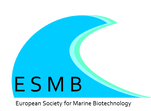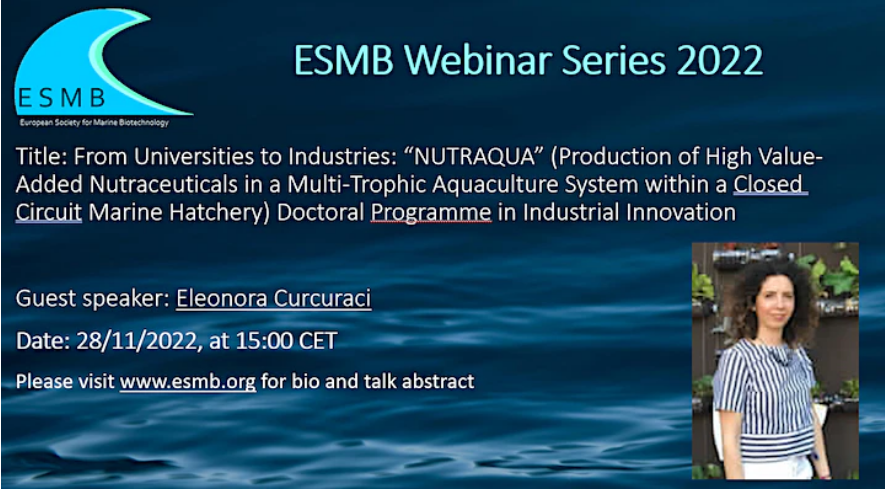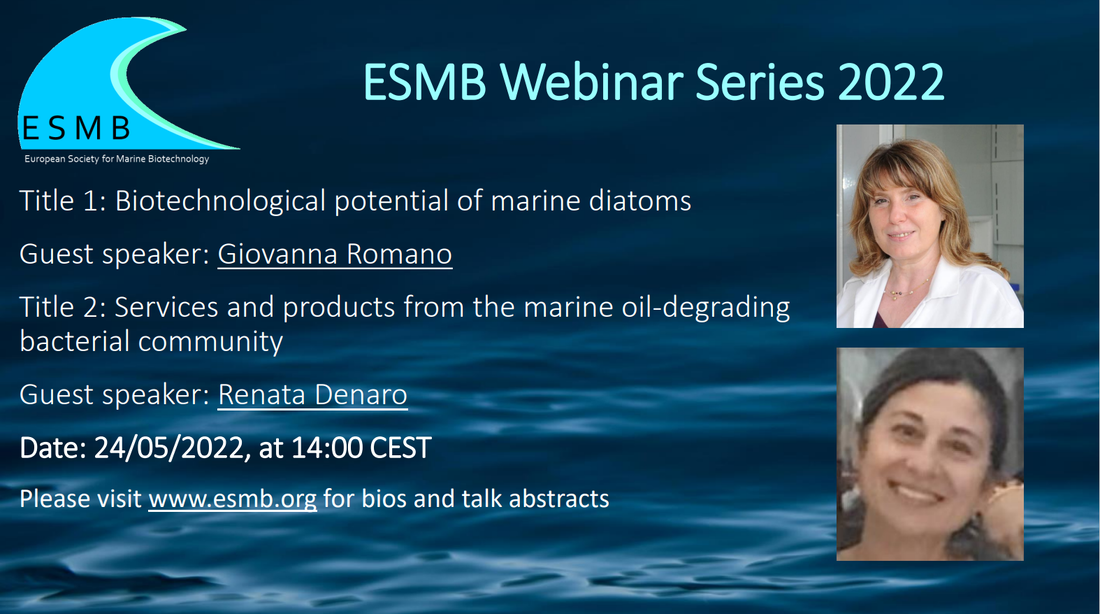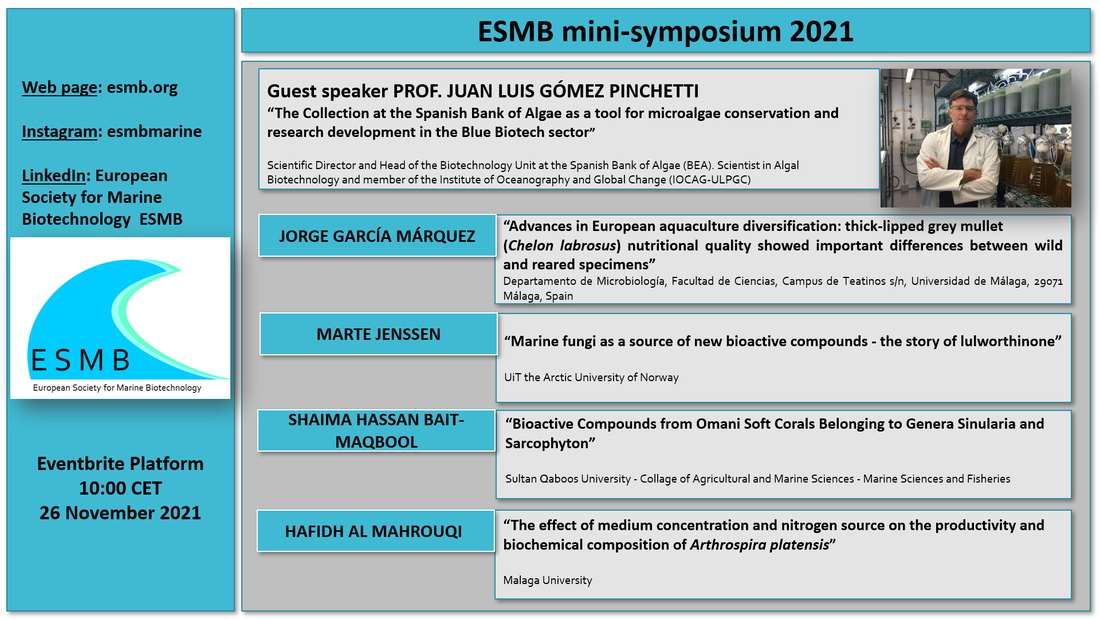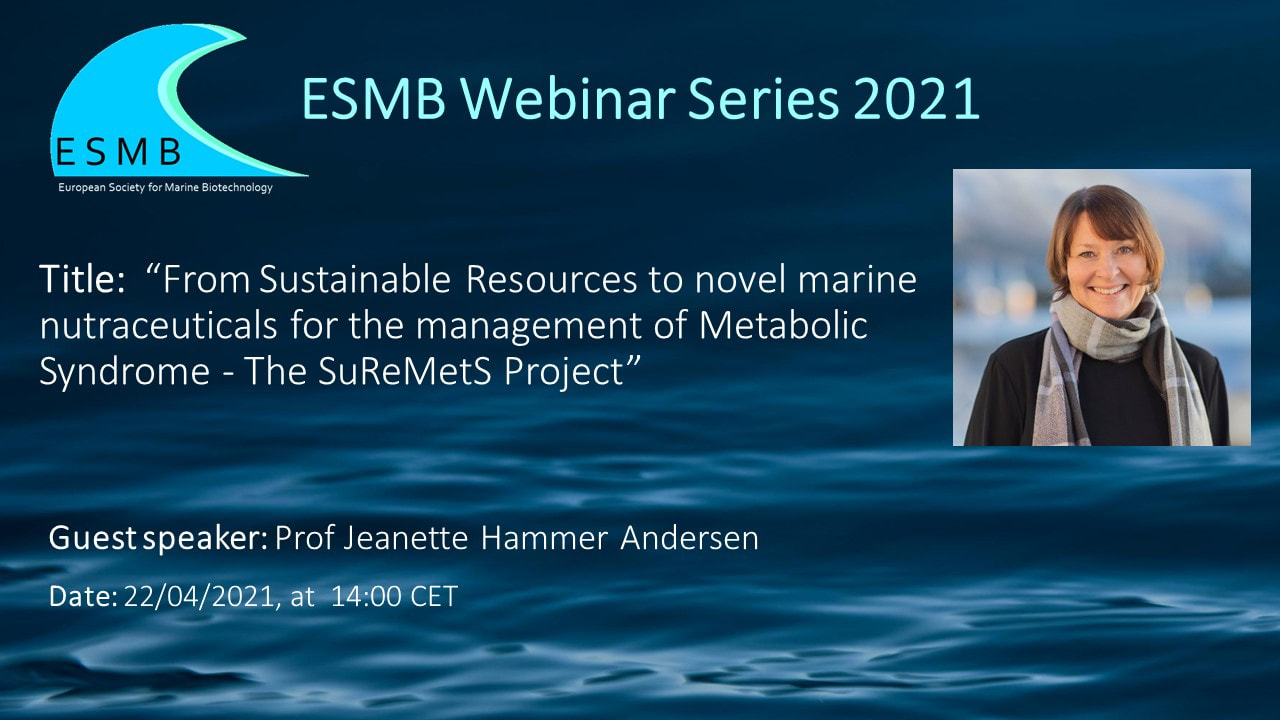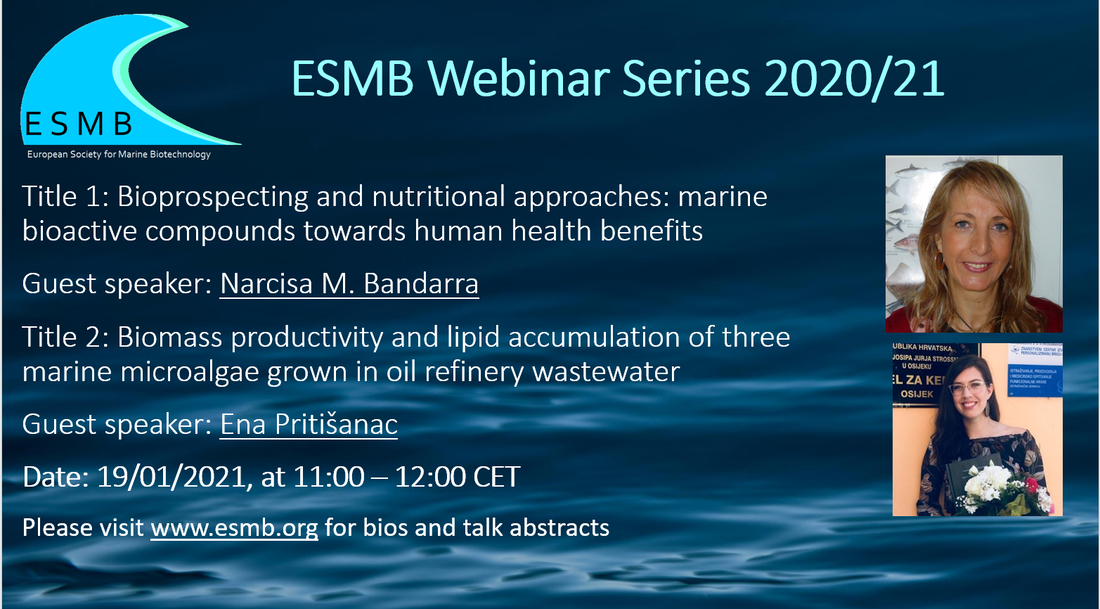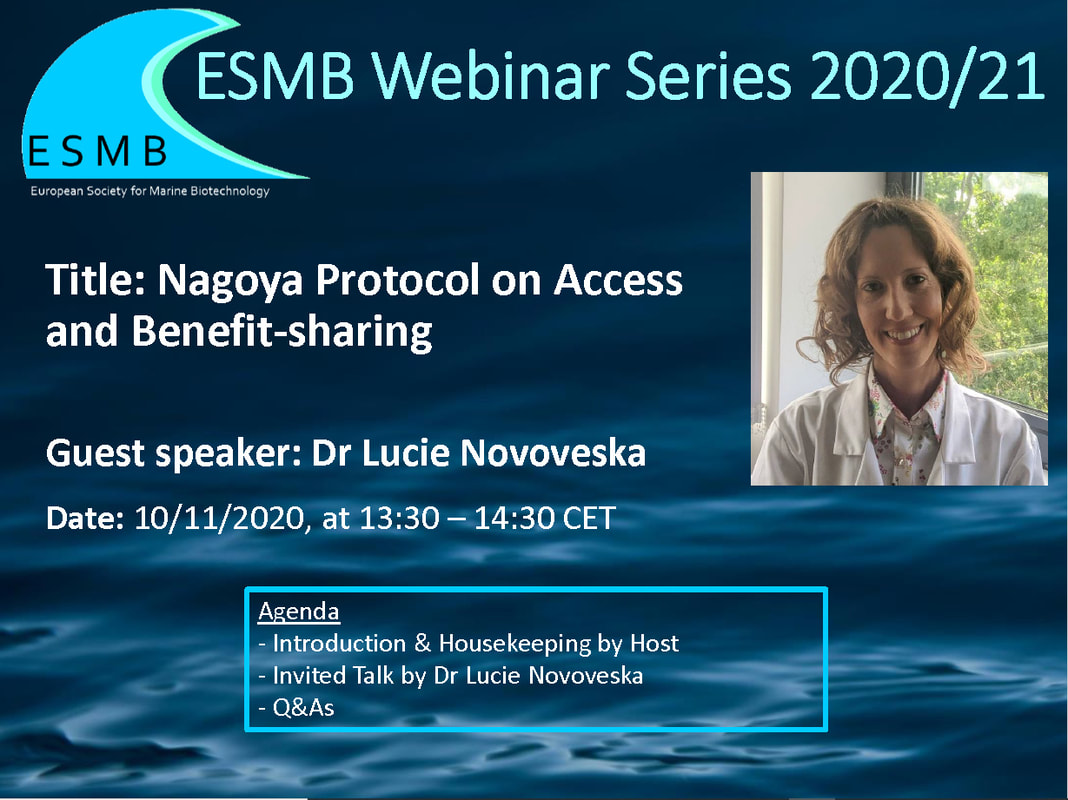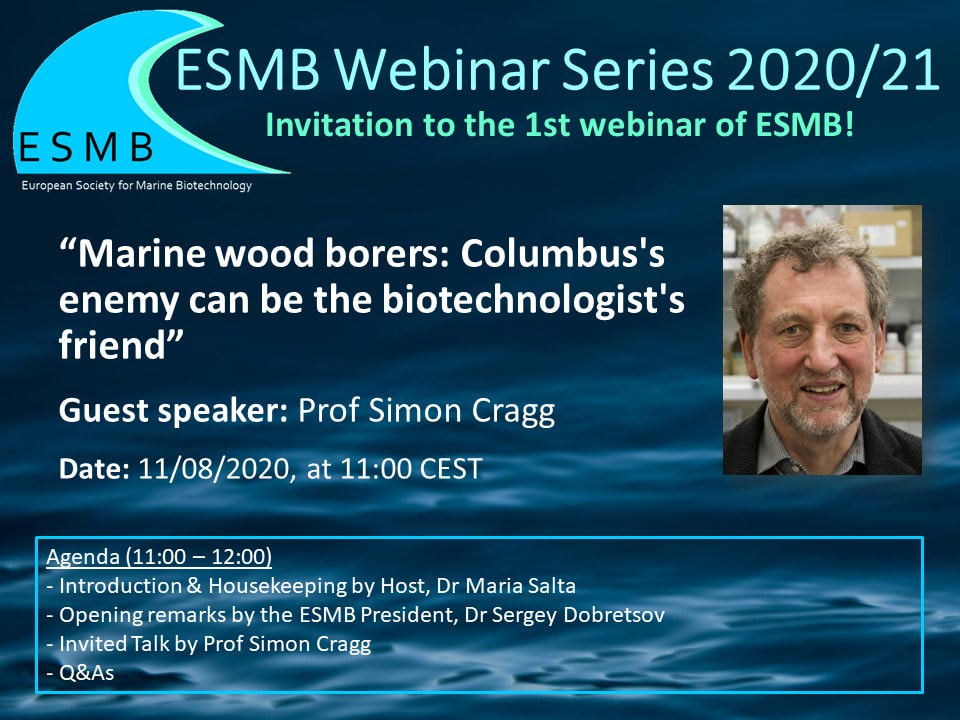esmb webinars
The ESMB Webinar Series will be inviting guest speakers from around the globe, to present their work which is linked with the exciting field of Marine Biotechnology. Topics will range from wood-eating animals and their biotechnological potential, to plastic degrading enzymes, microbe-deriving bioactive compounds, aquaculture and biofouling and many many more. We hope this Webinar Series will act as a platform for promoting and further enhancing collaborations while offering a window to new developments and stimulate interesting scientific conversations.
EACH WEBINAR IS FREE BUT YOU HAVE TO REGISTER
Procedure for attending the webinar:
1. Please look up the event at the Eventbrite website.
2. Then click the 'Register' button on the site.
3. Fill the registration form and follow further instructions.
4. You will receive a ticket sent as mail to the e-mail address you have provided (order confirmation).
5. At the time of the webinar you click the 'Go to the online event' from the mail received.
6. Please allow time for downloading the webex software for accessing the webinar, if not installed.
Procedure for attending the webinar:
1. Please look up the event at the Eventbrite website.
2. Then click the 'Register' button on the site.
3. Fill the registration form and follow further instructions.
4. You will receive a ticket sent as mail to the e-mail address you have provided (order confirmation).
5. At the time of the webinar you click the 'Go to the online event' from the mail received.
6. Please allow time for downloading the webex software for accessing the webinar, if not installed.
past webinars
Abstract
Integrated multi-trophic aquaculture systems (IMTA) represent a must nowadays to fulfill the fish products needing in a sustainable way. In this framework, this study was dedicated to the selection among microalgae, macroalgae and plants, of those species considered valuable candidates for the optimization of their cultivation in IMTA systems for the production of high value bioactive molecules and the extraction of these bioactive compounds for their use and industrial scale-up in both cosmeceuticals and nutraceuticals fields.
To achieve these goals, different experiments were conducted on three microalgae strains, widely cultivated: Nannochloropsis sp., Isochrysis galbana and Phaeodactylum tricornutum; on two local microalgae strains collected along the Sicilian coast and then isolated: Chlorella sp. and Dunaliella viridis; and, among seaweeds and plants, on Gracilaria gracilis and Artrochnemum macrostachyum, grown in a Sicilian seabream and seabass hatchery pond.
Integrated multi-trophic aquaculture systems (IMTA) represent a must nowadays to fulfill the fish products needing in a sustainable way. In this framework, this study was dedicated to the selection among microalgae, macroalgae and plants, of those species considered valuable candidates for the optimization of their cultivation in IMTA systems for the production of high value bioactive molecules and the extraction of these bioactive compounds for their use and industrial scale-up in both cosmeceuticals and nutraceuticals fields.
To achieve these goals, different experiments were conducted on three microalgae strains, widely cultivated: Nannochloropsis sp., Isochrysis galbana and Phaeodactylum tricornutum; on two local microalgae strains collected along the Sicilian coast and then isolated: Chlorella sp. and Dunaliella viridis; and, among seaweeds and plants, on Gracilaria gracilis and Artrochnemum macrostachyum, grown in a Sicilian seabream and seabass hatchery pond.
Eleonora Curcuraci short biography
Eleonora Curcuraci is a Marine Biologist and PhD on Earth and Marine Sciences at the University of Palermo. Currently she is grant holder within the “Marine Hazard” project (Italian Ministry of Research) and scientific supervisor for the research group of the Marine Biology Institute of Trapani, within the Italy-Tunisia project on marine biotechnology “ARIBiotech”.
Her research mainly focuses on marine organisms cultivation for their use in Integrated multi-trophic aquaculture systems (IMTA) for biomass production, value added natural compounds production and inorganic and organic nutrients removal methods (bioremediation). Use of model marine organisms for bioactive molecules production in response to environmental stressors and evaluation of the effects of contaminants on marine model organisms by ecotoxicological, biochemical and molecular analyses.
Currently she is member of the board as a student representative and responsible for social media divulgation of the European Society for Marine Biotechnology (ESMB), member of the Italian association for the study and application of microalgae (AISAM) and member of the Italian Society of Experimental Biology (S.I.B.S.).
Eleonora Curcuraci is a Marine Biologist and PhD on Earth and Marine Sciences at the University of Palermo. Currently she is grant holder within the “Marine Hazard” project (Italian Ministry of Research) and scientific supervisor for the research group of the Marine Biology Institute of Trapani, within the Italy-Tunisia project on marine biotechnology “ARIBiotech”.
Her research mainly focuses on marine organisms cultivation for their use in Integrated multi-trophic aquaculture systems (IMTA) for biomass production, value added natural compounds production and inorganic and organic nutrients removal methods (bioremediation). Use of model marine organisms for bioactive molecules production in response to environmental stressors and evaluation of the effects of contaminants on marine model organisms by ecotoxicological, biochemical and molecular analyses.
Currently she is member of the board as a student representative and responsible for social media divulgation of the European Society for Marine Biotechnology (ESMB), member of the Italian association for the study and application of microalgae (AISAM) and member of the Italian Society of Experimental Biology (S.I.B.S.).
Watch the webinar
This webinar may also be watched using the videolink: https://youtu.be/QQrroZyw4_I
Title 1:
Biotechnological potential of marine diatoms
Abstract
Diatoms are a group of phytoplanktonic organisms populating most aquatic environment. Their ecological success has been related to their ability to respond to environmental changes by producing secondary metabolites involved in defense and adaptation mechanisms. Besides their ecological functions, these compounds often display interesting bioactivities that could be exploited for various biotechnological applications.
Diatoms are thus receiving increasing attention as a promising source of products of wide application in the pharmaceutical, health, cosmetics, nutrition and nanomaterials sectors.
The webinar will present an overview on the biotechnological potential of diatoms and the technological advancement that is contributing to the exploitation of diatoms as sustainable and eco-friendly source of valuable compounds. Some example of bioactive molecules will be presented, with a special focus on lipid-derived bioactive metabolites.
Giovanna Romano short biography
Giovanna Romano is senior researcher at of the Stazione Zoologica Anton Dohrn, in the Eco-sustainable Marine Biotechnology Department (www.szn.it).
She graduated in Biological Sciences at the University of Naples Federico II, summa cum laude. Scholarship holder in Biochemistry for six years and subsequently permanent researcher at the SZN.
The major focus of her past researches was on the effects and mechanisms of action of bioactive secondary metabolites from marine diatoms using different in vitro and in vivo model systems.
She was involved in several Italian and EU projects focusing on drug discovery from marine microalgae and she is now coordinating a bilateral project Italy-South Africa aiming at identifying new biosynthetic pathways for valuable compounds in diatoms, though a genome-mining approach.
Current research interest is the identification and exploitation of diatom-derived natural compounds for the development of new products for pharmaceutical, cosmeceutical and nutraceutical applications, with a special attention on the study of pathways involved in the biosynthesis of compounds of biotechnological interest.
Dr. Romano is partner in the SZN-CNR spin-off company BioSEArch srl , founded in 2016 for the development of new pharmaceutical and cosmeceutical compounds from marine microalgae.
Biotechnological potential of marine diatoms
Abstract
Diatoms are a group of phytoplanktonic organisms populating most aquatic environment. Their ecological success has been related to their ability to respond to environmental changes by producing secondary metabolites involved in defense and adaptation mechanisms. Besides their ecological functions, these compounds often display interesting bioactivities that could be exploited for various biotechnological applications.
Diatoms are thus receiving increasing attention as a promising source of products of wide application in the pharmaceutical, health, cosmetics, nutrition and nanomaterials sectors.
The webinar will present an overview on the biotechnological potential of diatoms and the technological advancement that is contributing to the exploitation of diatoms as sustainable and eco-friendly source of valuable compounds. Some example of bioactive molecules will be presented, with a special focus on lipid-derived bioactive metabolites.
Giovanna Romano short biography
Giovanna Romano is senior researcher at of the Stazione Zoologica Anton Dohrn, in the Eco-sustainable Marine Biotechnology Department (www.szn.it).
She graduated in Biological Sciences at the University of Naples Federico II, summa cum laude. Scholarship holder in Biochemistry for six years and subsequently permanent researcher at the SZN.
The major focus of her past researches was on the effects and mechanisms of action of bioactive secondary metabolites from marine diatoms using different in vitro and in vivo model systems.
She was involved in several Italian and EU projects focusing on drug discovery from marine microalgae and she is now coordinating a bilateral project Italy-South Africa aiming at identifying new biosynthetic pathways for valuable compounds in diatoms, though a genome-mining approach.
Current research interest is the identification and exploitation of diatom-derived natural compounds for the development of new products for pharmaceutical, cosmeceutical and nutraceutical applications, with a special attention on the study of pathways involved in the biosynthesis of compounds of biotechnological interest.
Dr. Romano is partner in the SZN-CNR spin-off company BioSEArch srl , founded in 2016 for the development of new pharmaceutical and cosmeceutical compounds from marine microalgae.
Title 2:
Services and products from the marine oil-degrading bacterial community.
Abstract
The marine hydrocarbonoclastic bacteria (HCB) are able to consume oil as a sole source of carbon and energy. HCB are highly specialized in the selection of aliphatic or aromatic fractions because they harbor specific receptors, functional genes and enzymes. Moreover, they produce biosurfactants and siderophores which confer them competitive advantages in the use of the substrate. Indeed, pilot studies have demonstrated that HCB, in cooperation with syntrophic microorganisms, are able to degrade up to 80-90% of hydrocarbons, decreasing significantly the toxicity of the medium. It is worth noting that, recent literature highlighted the role of HCB also in the degradation of oil-derived plastic. The co-occurrence of HCB and hydrocarbons in marine environment has increased the interest on their use as bioindicators of oil pollution, even transforming them in luminescent bacterial bioreporters as early warning monitoring system. It is common knowledge that bioremediation adequately designed can offer number of advantages compared with the only chemical or physical treatment, since it is ecofriendly, economic and low-energy-consuming. However, after decades of studies and cutting-age technology, bioremediation in marine environment, unlike in soil remains underexploited.
Renata Denaro short biography
Renata Denaro is a Researcher at the Water Research Institute of the National Research Council and Professor of Marine Microbial Biotechnology at the University of Tor Vergata (Rome). She is awarded in Biological Sciences, awarded Ph.D in Biochemical and Biomolecular Sciences. Her work experience is on marine biotechnology, focusing on bioremediation based on bacteria able to degrade hydrocarbons and plastic in marine environment. Products from marine bacteria (eg. siderophore) are as well objects of her study. Renata was involved in many national and international research projects and also in the ERANET Marine Biotechnology. Currently, she is member of the working group on Marine Biotechnology of the ERANET BlueBio Cofund. She is author of more than 40 peer-reviewed articles and 10 book chapters, she is co-inventor of a patent for industrial invention (process + apparatus).
Services and products from the marine oil-degrading bacterial community.
Abstract
The marine hydrocarbonoclastic bacteria (HCB) are able to consume oil as a sole source of carbon and energy. HCB are highly specialized in the selection of aliphatic or aromatic fractions because they harbor specific receptors, functional genes and enzymes. Moreover, they produce biosurfactants and siderophores which confer them competitive advantages in the use of the substrate. Indeed, pilot studies have demonstrated that HCB, in cooperation with syntrophic microorganisms, are able to degrade up to 80-90% of hydrocarbons, decreasing significantly the toxicity of the medium. It is worth noting that, recent literature highlighted the role of HCB also in the degradation of oil-derived plastic. The co-occurrence of HCB and hydrocarbons in marine environment has increased the interest on their use as bioindicators of oil pollution, even transforming them in luminescent bacterial bioreporters as early warning monitoring system. It is common knowledge that bioremediation adequately designed can offer number of advantages compared with the only chemical or physical treatment, since it is ecofriendly, economic and low-energy-consuming. However, after decades of studies and cutting-age technology, bioremediation in marine environment, unlike in soil remains underexploited.
Renata Denaro short biography
Renata Denaro is a Researcher at the Water Research Institute of the National Research Council and Professor of Marine Microbial Biotechnology at the University of Tor Vergata (Rome). She is awarded in Biological Sciences, awarded Ph.D in Biochemical and Biomolecular Sciences. Her work experience is on marine biotechnology, focusing on bioremediation based on bacteria able to degrade hydrocarbons and plastic in marine environment. Products from marine bacteria (eg. siderophore) are as well objects of her study. Renata was involved in many national and international research projects and also in the ERANET Marine Biotechnology. Currently, she is member of the working group on Marine Biotechnology of the ERANET BlueBio Cofund. She is author of more than 40 peer-reviewed articles and 10 book chapters, she is co-inventor of a patent for industrial invention (process + apparatus).
Watch the webinar
This webinar may also be watched using the videolink: https://youtu.be/R9lGudd1CW4
Watch the webinar
The webinar may also be watched using this videolink: https://youtu.be/Wk1IBbIC_yw
Abstract:
The BlueBio Cofund project SuReMetS will develop novel marine ingredients from underutilized material from fisheries and microalgae targeting the management of metabolic syndrome (MetS). In order to utilize the marine biomasses in an economically viable manner, it is essential to find efficient ways to process the material to release valuable ingredients. One of the main goals of SuReMetS is therefore to identify enzymes that can be used to process biomass with high efficiency at low temperatures. The positive human health effects of marine ingredients are well established. SuReMetS will target biofunctional ingredients with beneficial effects on biomarkers of MetS. The chronic and complex nature of MetS, makes it challenging to employ a single drug for long-term medication, hence the development of marine nutraceuticals represents a safer and better long-term option. The seminar will present the project outline and the current status of the project that started last June.
Biography:
Jeanette Hammer Andersen is a professor in marine bioprospecting at UiT and head of the natural products platform Marbio at UiT. Marbio has expertise in screening of extract libraries of natural product, including both terrestrial and marine micro- and macroorganisms, and has successfully characterized several novel bioactive compounds. Marbio has obtained funding through the national infrastructure program in Norway (NOR-OPENSCREEN), and is a specialized node in the European Research Infrastructure Consortium (ERIC) EU-OPENSCREEN. Andersen’s research interest and focus is the discovery of novel bioactive compounds from the marine environment. In this seminar she will present the BlueBio Cofund project SuReMetS which she is coordinating.
Twitter: @hammerjeanet
Instagram: @marbio_uit
The BlueBio Cofund project SuReMetS will develop novel marine ingredients from underutilized material from fisheries and microalgae targeting the management of metabolic syndrome (MetS). In order to utilize the marine biomasses in an economically viable manner, it is essential to find efficient ways to process the material to release valuable ingredients. One of the main goals of SuReMetS is therefore to identify enzymes that can be used to process biomass with high efficiency at low temperatures. The positive human health effects of marine ingredients are well established. SuReMetS will target biofunctional ingredients with beneficial effects on biomarkers of MetS. The chronic and complex nature of MetS, makes it challenging to employ a single drug for long-term medication, hence the development of marine nutraceuticals represents a safer and better long-term option. The seminar will present the project outline and the current status of the project that started last June.
Biography:
Jeanette Hammer Andersen is a professor in marine bioprospecting at UiT and head of the natural products platform Marbio at UiT. Marbio has expertise in screening of extract libraries of natural product, including both terrestrial and marine micro- and macroorganisms, and has successfully characterized several novel bioactive compounds. Marbio has obtained funding through the national infrastructure program in Norway (NOR-OPENSCREEN), and is a specialized node in the European Research Infrastructure Consortium (ERIC) EU-OPENSCREEN. Andersen’s research interest and focus is the discovery of novel bioactive compounds from the marine environment. In this seminar she will present the BlueBio Cofund project SuReMetS which she is coordinating.
Twitter: @hammerjeanet
Instagram: @marbio_uit
Watch the webinar
The webinar may also be watched using this videolink: https://youtu.be/czrCOgWl5KM
Biographies
Title 1: Narcisa Bandarra (Researcher) holds habilitation in Ocean Sciences by Faculty of Sciences of Lisbon and PhD in Biotechnology by Instituto Superior Técnico of Lisbon. She is Head of Aquaculture, Upgrading and Bioprospecting Division from Portuguese Institute for the Sea and Atmosphere, I.P. IPMA) from 2014, she has twenty-nine years of scientific work in the area of upgrading of fishery and aquaculture products with special focus on biochemical and nutritional value of fishery and aquaculture products, seeking their importance for health and well-being of consumers as well as upgrading the best of these products by the productive sector. The result of her scientific activity is reflected in the publication more than one hundred and seventy scientific articles in international journals, participation in fifty-five projects of national and international R&D and the orientation of seventy-seven undergraduate, master, doctorate and national international postdoctoral students. She is the Portuguese focal point of European Fish Technologists Association (WEFTA) and she was invited as expert to the High Level Panel in Ocean economy (HLPO) https://oceanpanel.org/.
Orcid https://orcid.org/0000-0002-7563-9226
Title 2: :Ena Pritišanac (mag.biol.) was born 31.5.1994 in Osijek, Croatia., and graduated in 2017 from the Department of Biology at the University of J. Juraj Strossmayer in Osijek and got the title mag. biol. During college education, she volunteered in the Laboratory for Water Ecology and worked on the popularisation of science at the ZOO and Aquarium where she led and participated in numerous workshops in Osijek. Following enrolment in the graduate study of Biology, she became a leader of the student project “Spreading of invasive species Aedes japonicus (Theobald, 1901) in east Croatia“ for which she won the fundings. Currently, Ena is working as an assistant in the Laboratory of marine ecotoxicology at the Centre for Marine Research in Rovinj and she is in the second year of Interdisciplinary doctoral study of Oceanology at the Faculty of Science in Zagreb, Croatia. Her skills and competencies include laboratory cultivation and analytical assays of phytoplankton, cultivation of phytoplankton in SCADA photobioreactor system, microscopy, culture isolation, spectrophotometry, gravimetry, basic DNA manipulation and extraction including work on nanodrop, electrophoresis. Briefly, she was at the algal training course at Fraunhofer IBG in Stuttgart called Algal Biotechnology techniques and opportunities for the sustainable bioeconomy from 12th to 13th November. 2019. At the domestic Symposium of Ph.D. students in Zagreb, she presented her work in a form of a poster titled: DNA isolation of four marine microalgae which was very well received.
Title 1: Narcisa Bandarra (Researcher) holds habilitation in Ocean Sciences by Faculty of Sciences of Lisbon and PhD in Biotechnology by Instituto Superior Técnico of Lisbon. She is Head of Aquaculture, Upgrading and Bioprospecting Division from Portuguese Institute for the Sea and Atmosphere, I.P. IPMA) from 2014, she has twenty-nine years of scientific work in the area of upgrading of fishery and aquaculture products with special focus on biochemical and nutritional value of fishery and aquaculture products, seeking their importance for health and well-being of consumers as well as upgrading the best of these products by the productive sector. The result of her scientific activity is reflected in the publication more than one hundred and seventy scientific articles in international journals, participation in fifty-five projects of national and international R&D and the orientation of seventy-seven undergraduate, master, doctorate and national international postdoctoral students. She is the Portuguese focal point of European Fish Technologists Association (WEFTA) and she was invited as expert to the High Level Panel in Ocean economy (HLPO) https://oceanpanel.org/.
Orcid https://orcid.org/0000-0002-7563-9226
Title 2: :Ena Pritišanac (mag.biol.) was born 31.5.1994 in Osijek, Croatia., and graduated in 2017 from the Department of Biology at the University of J. Juraj Strossmayer in Osijek and got the title mag. biol. During college education, she volunteered in the Laboratory for Water Ecology and worked on the popularisation of science at the ZOO and Aquarium where she led and participated in numerous workshops in Osijek. Following enrolment in the graduate study of Biology, she became a leader of the student project “Spreading of invasive species Aedes japonicus (Theobald, 1901) in east Croatia“ for which she won the fundings. Currently, Ena is working as an assistant in the Laboratory of marine ecotoxicology at the Centre for Marine Research in Rovinj and she is in the second year of Interdisciplinary doctoral study of Oceanology at the Faculty of Science in Zagreb, Croatia. Her skills and competencies include laboratory cultivation and analytical assays of phytoplankton, cultivation of phytoplankton in SCADA photobioreactor system, microscopy, culture isolation, spectrophotometry, gravimetry, basic DNA manipulation and extraction including work on nanodrop, electrophoresis. Briefly, she was at the algal training course at Fraunhofer IBG in Stuttgart called Algal Biotechnology techniques and opportunities for the sustainable bioeconomy from 12th to 13th November. 2019. At the domestic Symposium of Ph.D. students in Zagreb, she presented her work in a form of a poster titled: DNA isolation of four marine microalgae which was very well received.
| abstract_narcisa_m_bandarra.docx | |
| File Size: | 20 kb |
| File Type: | docx |
| abstract_and_talk_title_pritišanac.docx | |
| File Size: | 14 kb |
| File Type: | docx |
Watch the webinar
The webinar may also be watched using this videolink:: https://youtu.be/el44NOsBWiw
Biography. Dr Lucie Novoveska is a Senior Researcher in Algal Biotechnology at Scottish Association for Marine Science. Lucie’s research focuses on Blue Biotechnology. She has worked 6 years in the algal industries in the USA and the UK. Her interests range from wastewater bioremediation (removal of nutrients, heavy metals and pharmaceuticals compounds), algal ecology (productivity of algal consortia and polycultures) to production of high value compounds from algae (carotenoids, fatty acids, polysaccharides). Lucie serves as an expert for European Cooperation in Science and Technology (Ocean4Biotech) where she contributes to the work related to Legal aspects, intellectual property rights and ethics. She is also an Associate Editor for journal Applied Phycology.
| esmb_webinar_flyer_lucie_novoveska_final.pdf | |
| File Size: | 752 kb |
| File Type: | |
Watch the webinar
The webinar may also be watched using this videolink: https://youtu.be/UoLkToEShes
Biography: Prof Simon Cragg is currently exploring mechanisms for digesting woody plant detritus in the marine environment. Marine wood-boring crustaceans and bivalves have an unusual ability to digest the complex of polymers (lignocellulose) that forms wood. Prof Cragg is interested in how these animals achieve the release of sugars from this recalcitrant complex. With collaborators from many disciplines and across the globe Prof Cragg is applying this knowledge to biotechnological transformation of woody substrates; development of novel methods for wood protection; and assessing borer-driven carbon fluxes from mangroves. The interdisciplinary nature of Prof Cragg's work has developed through collaborations with members of the Centre for Enzyme Innovation a the University of Portsmouth (structural biology, transcriptomics, molecular biology), and also with the Centre for Novel Agricultural Products at the University of York (enzymology, biotechnological implications) and the Department of Biochemistry at the University of Cambridge (hemicellulose enzymatic breakdown). More on Prof Cragg here.
| esmb_1st_webinar.pdf | |
| File Size: | 717 kb |
| File Type: | |
